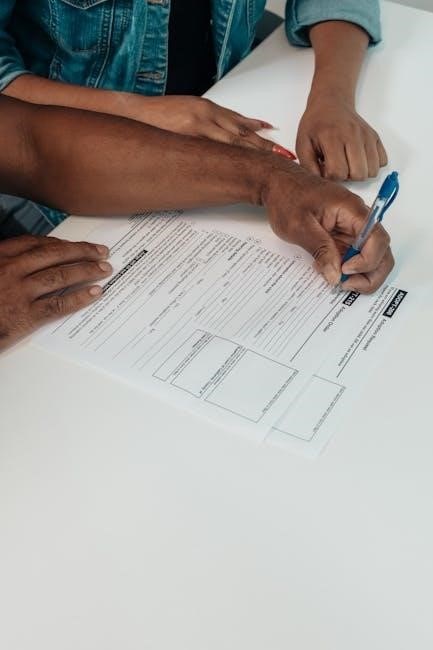The British Columbia Rental Application Form is a essential document for both landlords and tenants in BC, streamlining the rental process and ensuring legal compliance.
It provides a standardized way to evaluate potential tenants while protecting their rights, making it a crucial tool for fostering fair and transparent rental relationships in the province.
1.1 Importance of the Rental Application Form in BC
The British Columbia Rental Application Form is essential for both landlords and tenants, ensuring a fair and transparent rental process.
It helps landlords assess applicants’ suitability while protecting tenants’ rights, promoting legal compliance and accountability in the province’s rental market.
The form streamlines tenant screening, reducing disputes and ensuring all parties understand their responsibilities, fostering a stable rental environment in BC.
1.2 Overview of the Rental Application Process
The rental application process in British Columbia begins with prospective tenants submitting a completed application form to the landlord.
Landlords then review the form, often conducting credit checks and reference verifications to assess the applicant’s suitability.
If approved, a tenancy agreement is signed, outlining terms and conditions for both parties, ensuring a legally binding and clear rental arrangement.
This process is designed to protect both landlords and tenants, promoting a fair and structured approach to renting properties in BC.
Key Sections of the British Columbia Rental Application Form
The form includes personal information, rental history, employment details, financial data, references, and additional requirements to help landlords assess potential tenants effectively and fairly.
2.1 Personal Information
The personal information section typically includes the applicant’s full name, contact details, date of birth, and citizenship status. This helps landlords verify identity and ensures legal compliance. Applicants may also be asked for emergency contact details and their current address. Landlords cannot request sensitive information like marital status or number of children. This section is crucial for establishing a tenant’s background and ensuring transparency. Accurate and honest disclosure is essential for a smooth rental process and building trust between landlord and tenant.
2.2 Rental History
The rental history section requires applicants to provide details about their past tenancies, including addresses, dates of occupancy, and landlord references. This helps landlords assess the applicant’s reliability and rental behavior. Applicants may need to explain gaps in rental history or past issues, such as evictions or disputes. Landlords use this information to evaluate the applicant’s ability to maintain a tenancy responsibly. Honest and complete disclosure is crucial for a positive evaluation and securing the rental property.
2.3 Employment Information
The employment section requires applicants to provide details about their current and past jobs, including employer names, job titles, and durations of employment. This helps landlords assess financial stability and reliability. Applicants may also need to disclose monthly income, bonuses, or other sources of income. Some landlords may request proof of employment, such as pay stubs or a letter from an employer. Accurate and complete employment information is vital for landlords to evaluate the applicant’s ability to pay rent consistently.
2.4 Financial Information
The financial section of the BC rental application requires applicants to provide detailed financial data. This includes banking information, savings, investments, and debt obligations. Landlords use this to assess the applicant’s financial health and ability to meet rental obligations. Applicants may need to provide recent bank statements or tax returns. Additionally, landlords often perform credit checks to evaluate credit history and score, which are crucial for determining financial reliability and responsibility. This ensures landlords can make informed decisions about potential tenants.
2.5 References
The references section of the BC rental application requires applicants to provide contact information for previous landlords, employers, and personal references. This allows landlords to verify the applicant’s rental history, employment stability, and personal character. Landlords often use these references to assess the applicant’s reliability and responsibility as a tenant.
Applicants should ensure their references are reachable and able to provide positive feedback. Providing accurate and professional references can significantly strengthen a rental application and increase the chances of approval. It’s important to inform references in advance to expedite the verification process.
2.6 Additional Requirements
Some landlords may request additional documentation or information beyond the standard application. This could include proof of pet vaccination, renter’s insurance, or a co-signer for students or individuals with limited credit history. Applicants should be prepared to provide these documents promptly to avoid delays. These requirements help landlords assess potential risks and ensure a smooth tenancy. It’s important for tenants to review these additional requests carefully to ensure they meet all necessary criteria and comply with legal standards.

Legal Requirements and Tenant Rights
The Residential Tenancy Act (RTA) outlines tenant rights and landlord obligations, emphasizing privacy and data protection while ensuring a fair and legally compliant rental process in BC.
3.1 Understanding the Residential Tenancy Act (RTA)
The Residential Tenancy Act (RTA) governs rental relationships in British Columbia, ensuring fairness and compliance for both landlords and tenants. It outlines legal obligations, including tenancy agreements, rent increases, and dispute resolution processes. The RTA also establishes protections for tenants, such as limits on security deposits and eviction procedures, while balancing landlord rights to property management.
Understanding the RTA is crucial for navigating the rental process, as it provides a framework for resolving conflicts and ensures all parties adhere to provincial housing laws. Tenants and landlords must familiarize themselves with its provisions to maintain a lawful and harmonious rental relationship.
3.2 What Landlords Can and Cannot Ask For
Landlords in British Columbia are permitted to request specific information to assess a tenant’s suitability, such as rental history, employment details, and references. However, they cannot ask for personal information unrelated to tenancy, including marital status, ethnicity, or medical history, as these are protected under privacy laws.
The Residential Tenancy Act (RTA) prohibits discriminatory questions and ensures tenants’ privacy. Landlords must avoid inquiries that could unfairly disadvantage applicants, focusing solely on relevant factors to maintain a fair and lawful rental application process.
3.3 Tenant Privacy and Data Protection
Tenants in British Columbia have rights protecting their personal information under the Residential Tenancy Act (RTA) and the Personal Information Protection Act (PIPA). Landlords must only collect data relevant to the tenancy and ensure it is stored securely to prevent unauthorized access or misuse.
Tenants can request access to their personal information and corrections if necessary. Landlords are legally obligated to respect privacy rights, ensuring transparency and accountability throughout the rental application and tenancy process.
Completing the Rental Application Form
Completing the form accurately ensures a smooth process. Provide detailed personal, rental, and employment information. Ensure all sections are filled thoroughly to avoid delays and meet legal standards.
4.1 Step-by-Step Guide for Tenants
Review the application form thoroughly. Gather required documents, such as ID, proof of employment, and rental history. Fill in all sections accurately, ensuring honesty. Double-check for errors or omissions. Submit promptly to increase chances of approval. Keep a copy for personal records. This process helps tenants present themselves as reliable candidates while complying with legal standards in British Columbia.
4.2 Tips for Making Your Application Stand Out
To make your application stand out, ensure all sections are filled completely and accurately. Provide additional documents like pay stubs or a letter of employment. Highlight positive rental history and stable employment. Be proactive in addressing any potential concerns, such as past credit issues. A well-organized and professional application demonstrates responsibility and increases your chances of approval. Consider offering references upfront to save time for both parties.
4.3 Common Mistakes to Avoid
Common mistakes include incomplete sections, missing documents, or inaccurate information. Omitting rental history or employment details can delay approval. Failing to disclose past issues, like evictions or credit problems, can lead to rejection. Providing unverified references or incomplete contact information is also problematic. Additionally, ignoring the requested format or submitting unsigned forms can result in delays. Ensure all fields are filled accurately and thoroughly to avoid complications and demonstrate reliability as a tenant.
Screening Process for Landlords
Landlords in BC use rental applications to evaluate tenants through credit checks, reference verification, and rental history analysis, ensuring informed decisions while complying with legal standards.
5.1 How Landlords Evaluate Applications
Landlords in British Columbia evaluate rental applications by reviewing personal information, employment history, financial stability, and rental references to assess suitability. They often conduct credit checks and verify employment details to ensure tenants can afford the rent. Rental history is also scrutinized to identify past issues. Landlords may prioritize applicants with stable income, good credit scores, and positive references. Additionally, they consider additional requirements like pet ownership or student status, ensuring compliance with legal standards to avoid discrimination and select qualified tenants fairly.
5.2 The Role of Credit Checks
Credit checks play a pivotal role in assessing a tenant’s financial stability and creditworthiness. Landlords use credit reports to evaluate an applicant’s history of debt repayment, ensuring they can manage rental payments. A high credit score enhances an application’s appeal, while poor credit may lead to rejection or require a co-signer. Consent is mandatory for credit checks, and landlords must comply with privacy laws. This tool helps landlords make informed decisions, balancing tenant qualifications with rental property risks effectively in British Columbia.
5.3 Reference Checks and Verification
Reference checks and verification are critical steps in evaluating rental applicants. Landlords use these to confirm employment details, rental history, and personal references, ensuring the information provided is accurate. This process helps assess a tenant’s reliability and responsibility. Applicants should provide accurate contact information for references to facilitate a smooth verification process. Landlords must handle this information confidentially and in compliance with privacy laws, such as British Columbia’s Personal Information Protection Act (PIPA). This step is vital for making informed tenancy decisions.

Special Considerations
Special considerations in BC rental applications include students, pet owners, and those applying for subsidized housing. Each group may require additional documentation or specific landlord approvals.
6.1 Rental Applications for Students
Students applying for rental properties in British Columbia often face unique challenges, such as limited rental history or income instability. Many landlords require students to provide additional documentation, such as proof of enrollment or a guarantor. Students may need to demonstrate financial stability through scholarships, part-time income, or parental support. Some landlords may also request a co-signer to secure the tenancy. It’s important for students to prepare thoroughly and understand their rights under the Residential Tenancy Act to ensure a fair and smooth application process.
6.2 Applications with Pets
Rental applications with pets in British Columbia often require additional documentation, such as pet agreements or deposits. Landlords may ask for proof of vaccination, spaying/neutering, and breed information. Some properties have pet-specific rules or restrictions. Tenants with pets should be prepared to provide references for their pets and may face higher security deposits. Clear communication about pet policies and ensuring compliance with the Residential Tenancy Act is essential to avoid disputes and ensure a smooth rental process for both parties.
6.3 Applications for Subsidized or Affordable Housing
Applications for subsidized or affordable housing in British Columbia require specific documentation and meet strict eligibility criteria. Tenants must provide proof of income, employment status, and financial need. Priority may be given to families, seniors, or individuals with disabilities. The process often involves additional steps, such as interviews or reviews of rental history. Understanding the requirements and deadlines is crucial to successfully securing affordable housing options in BC.
Tenants should ensure all documentation, including tax returns or employer letters, is accurate and submitted on time. This ensures a fair and transparent evaluation process.

Disputes and Rejections
Disputes and rejections in rental applications are handled through structured processes, ensuring fairness and transparency for both tenants and landlords in British Columbia.
7.1 Handling Application Rejections
If a rental application is rejected in British Columbia, tenants have the right to seek clarification on the reasons behind the decision. Understanding the rationale can help improve future applications.
Tenants may also file a dispute with the Residential Tenancy Branch (RTB) if they believe the rejection was unfair or discriminatory, ensuring their rights are protected under the Residential Tenancy Act.
7.2 Dispute Resolution Options
In British Columbia, disputes related to rental applications can be resolved through the Residential Tenancy Branch (RTB), which provides a formal process for addressing issues between landlords and tenants.
Tenants and landlords can submit their disputes to the RTB, which will review evidence and make a binding decision. Additionally, parties may opt for mediation or negotiation to resolve conflicts amicably before escalating to formal proceedings.
7.4 Role of the Residential Tenancy Branch (RTB)
The Residential Tenancy Branch (RTB) plays a vital role in British Columbia’s rental process by providing a framework for resolving disputes and ensuring compliance with the Residential Tenancy Act (RTA). The RTB offers mediation services and adjudicates disputes between landlords and tenants, ensuring fair treatment for all parties involved. It also serves as a resource for both tenants and landlords to understand their rights and obligations, fostering a balanced rental environment across the province.

Best Practices for Landlords and Tenants
Transparency, respect, and clear communication are key to a positive rental experience. Both parties should maintain professional relationships and document all interactions for mutual understanding and accountability.
8.1 Maintaining Professional Relationships
Maintaining professional relationships between landlords and tenants is crucial for a smooth rental experience. Both parties should communicate clearly and respectfully, ensuring mutual understanding and trust. Landlords should be approachable and transparent about expectations and policies, while tenants should fulfill their obligations promptly and respectfully. Professionalism fosters a positive and respectful environment, reducing potential conflicts and ensuring a harmonious tenancy. Regular updates and open dialogue help build a long-term, stress-free relationship for both parties involved in the rental process.
By upholding professionalism, landlords and tenants can create a foundation of mutual respect and accountability, benefiting both sides throughout the tenancy. This approach ensures clarity, fairness, and a positive rental experience in British Columbia.
8.2 Clear Communication Strategies
Clear communication is vital in the rental process to avoid misunderstandings and ensure a smooth tenancy. Landlords should provide detailed written agreements and maintain open dialogue with tenants. Establishing a primary method of communication, such as email or phone, helps ensure timely updates. Tenants should also communicate issues promptly, allowing landlords to address them efficiently. Active listening and transparency foster trust, while regular updates on maintenance or policy changes keep everyone informed. Clear communication strategies promote a positive and respectful rental relationship in British Columbia.
8.3 Documenting the Rental Process
Documenting the rental process ensures clarity and accountability for both landlords and tenants. Keeping records of applications, lease agreements, and communication helps prevent disputes. Landlords should maintain copies of rental applications, credit checks, and reference verifications. Tenants should also keep records of payments, agreements, and any issues reported. Digital tools like online platforms can simplify documentation and ensure secure storage. Clear documentation provides a transparent and reliable reference point for all parties involved in the rental relationship.
Digital and Online Rental Applications
Digital rental applications streamline the process, offering convenience and efficiency for both landlords and tenants in British Columbia. Online platforms reduce paperwork and save time.
9.1 Benefits of Online Application Forms
Online rental application forms offer numerous advantages, including convenience, faster processing, and reduced paperwork. Tenants can apply from anywhere, at any time, streamlining the rental process. Digital platforms also minimize errors and ensure applications are complete. Automated systems can verify information instantly, saving landlords time. Additionally, online forms are environmentally friendly and provide a secure method for submitting sensitive data. They also allow for easy tracking and communication, enhancing the overall rental experience for both parties in British Columbia.
9.2 Security Considerations for Digital Applications
Digital rental applications require robust security measures to protect sensitive tenant information. Encryption and secure servers are essential to prevent data breaches. Landlords must comply with privacy laws, such as PIPEDA, to ensure personal data is handled responsibly. Tenants should verify the platform’s security features before submitting applications. Regular software updates and strong passwords further safeguard the process. Ensuring confidentiality and data integrity is crucial to maintain trust and legal compliance in British Columbia’s rental market.
9.3 Popular Platforms for Rental Applications in BC
Popular platforms for rental applications in British Columbia include Lumin, RentCafe, and Zillow. These platforms offer user-friendly interfaces for submitting applications and streamline the rental process. They often include features like online forms, tenant screening tools, and secure document uploads. Platforms like PadMapper also provide property listings and application management, making it easier for landlords and tenants to connect. These digital solutions enhance efficiency and accessibility in BC’s competitive rental market, catering to both landlords and tenants’ needs effectively.
The British Columbia Rental Application Form plays a vital role in streamlining rental processes, ensuring fairness and legal compliance for both landlords and tenants alike.
10.1 Summarizing the Key Points
The British Columbia Rental Application Form is a crucial document ensuring fairness and transparency in the rental process. It protects both landlords and tenants by outlining legal requirements, tenant rights, and necessary disclosures. The form streamlines the evaluation of potential tenants while safeguarding personal information. By understanding its sections, tenants can present a strong application, and landlords can make informed decisions. This balanced approach supports positive tenant-landlord relationships and compliance with BC’s rental laws, fostering a fair housing market for all parties involved.
10.2 Future Trends in Rental Applications
The future of British Columbia rental applications lies in digital innovation and enhanced privacy protections. Expect increased use of online platforms for faster, more transparent processes. Artificial intelligence may play a role in streamlining tenant screening, while blockchain could enhance data security. Additionally, there may be a shift toward more sustainable practices, such as paperless applications. These trends aim to improve efficiency, fairness, and accessibility for both landlords and tenants, ensuring the rental application process remains adaptable to evolving needs and technologies.
10.3 Encouraging a Positive Rental Experience
A positive rental experience begins with clear communication and mutual respect between landlords and tenants. Ensuring transparency in the application process and understanding each party’s rights fosters trust. Landlords should maintain open lines of communication, while tenants should meet obligations timely. By respecting privacy and addressing concerns promptly, both parties can create a harmonious relationship. This foundation leads to long-term satisfaction and a smooth rental experience for everyone involved in British Columbia’s competitive housing market.
Additional Resources
Explore resources like the Residential Tenancy Branch for legal guidance, tenant rights organizations, and landlord support services in British Columbia.
11.1 Where to Find Assistance for Tenants
Tenants in British Columbia can find assistance through the Residential Tenancy Branch (RTB), which provides guidance on rental applications and tenancy disputes.
Local non-profits and legal aid services also offer support, helping tenants understand their rights and navigate the rental process effectively.
Online resources and community organizations are additional avenues for tenants seeking help with rental applications or addressing concerns related to housing in BC.
11.2 Support for Landlords in BC
Landlords in British Columbia can access support through the Residential Tenancy Branch (RTB), which offers guidance on rental applications and legal compliance.
Local legal aid services and property management organizations provide additional resources to help landlords navigate tenant screening and rental agreements effectively.
Online forums and educational materials are also available, ensuring landlords in BC have comprehensive support to manage their rental properties successfully.
11.3 Relevant Legal Resources and Guides
The Residential Tenancy Branch (RTB) provides essential legal resources and guides for landlords and tenants in BC, ensuring compliance with the Residential Tenancy Act.
Legal aid services and tenant advocacy groups offer free advice and support for navigating rental applications and disputes.
Additionally, the BC Housing website offers detailed guides on rental agreements and tenant rights, while community legal clinics host workshops on rental law and processes.
These resources help both parties understand their obligations and rights under BC rental laws.

FAQs About the Rental Application Process
Common questions about the rental application process in BC include inquiries about required documents, legal rights, and steps to complete the form successfully.
12.1 Common Questions from Tenants
Tenants often ask about required documents, legal rights, and application fairness. They also inquire about handling rejections and understanding their rights regarding pets and personal information privacy.
12.2 Frequently Asked Questions by Landlords
Landlords often ask about legal requirements for screening tenants, acceptable documents for verification, and their rights in evaluating applications. They also inquire about handling incomplete applications, ensuring compliance with the RTA, and understanding their responsibilities in maintaining tenant privacy. Additionally, landlords seek clarity on the role of the Residential Tenancy Branch (RTB) in disputes and the best practices for documenting the rental process to avoid potential legal issues.
12.3 General Inquiries About the Process
General inquiries often focus on understanding the purpose and structure of the British Columbia Rental Application Form. Many ask about the importance of legal compliance and how the form balances tenant rights with landlord needs. Others seek clarity on how the process ensures fairness and transparency in selecting tenants. Additionally, there are questions about how the form helps maintain professional relationships and streamline the rental experience for both parties involved.
Common questions also include how the form addresses privacy concerns and what steps are taken to ensure data protection. Understanding these aspects helps both landlords and tenants navigate the rental process confidently and informed.
